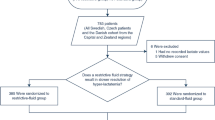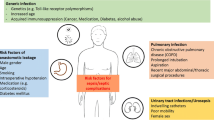Abstract
Background: Selective decontamination of the digestive tract (SDD) with non-absorbable antibiotics was extensively used at intensive care units (ICU) in Europe to prevent nosocomial infections in critically ill patients. After three recent meta-analyses in which it was demonstrated that SDD did not influence hospital stay and mortality in these patients several ICU's decided to stop the routine use of SDD.
Objective: To examine the effects of the cessation of SDD on nosocomial infections, mortality and hospital stay at an ICU in post-operative patients.Design: Retro-and prospective follow-up.Patients: Post-operative patients with mechanical ventilation (MV) for ≥5 days at an ICU were included. The retrospective group (SDD group) comprised of 138 patients (mean age 66, range 10–91; 78% male) and the prospective group (non-SDD group) of 142 patients (mean age 67, range 18–85; 65% male). The SDD regime consisted of colistin, tobramycin and amphotericin B. Cessation of the SDD was accompanied by a shortening of the routine intravenous cefuroxime prophylaxis.Results: There was a nonsignificant increase from an average 21 to 23 days ICU stay in the non-SDD group when compared with the SDD group (p>0.05). Of the 280 patients 97 (35%) died on the ICU. The risk of death was lower in the non-SDD group (adjusted hazard ratio 0.7 with 95% CI 0.5–1.1). There was a trend towards an increase in infections as a cause of death in the non-SDD group (38% of the ceased patients versus 20% in the SDD group) (p>0.05). The incidence of respiratory tract infection (per 1000 person days) was 80 (95% CI 48–113) in the non-SDD group versus 19 (95% CI 8–22) in the SDD group (adjusted hazard ratio 4.5 (95% CI 2.9–7.1)).
Conclusion: The cessation of the routine application of SDD in post-operative patients mechanically ventilated for 5 days or more did nod adversely affect survival nor increased length of stay at the ICU. There may have been a shift to infections as a cause of death after cessation of SDD.
Similar content being viewed by others
References
RamsayG, ReidyJJ. Selective decontamination in intensive care practice; a review of clinical experience. Intensive Care Med 1990;16(suppl 3):S217–23.
StoutenbeekCP, vanSaeneHKF, MirandaDR, ZandstraDF. The effect of selective decontamination of the digestive tract on colonization and infection rate in multiple trauma patients. Intensive Care Med 1984;10:185.
vanSaeneHKF, StoutenbeekCP, StolerJK. Selective decontamination of the digestive tract in the intensive care unit; current status and future prospects. Critical Care Medicine 1992;20:691–703.
Vandenbroucke-GraulsCMJE, VandenbrouckeJP. Effect of selective decontamination of the digestive tract on respiratory tract infections and mortality in the intensive care unit. The Lancet 1991;338:859–62.
GomezEC, MarkowskySJ, RotschaferJC. Selective decontamination of the digestive tract in intensive care patients; review and commentary. Ann Pharmacother 1992;26:963–76.
LoiratP, JohansonWG, vanSaeneHK, BasuernfiendA, BinslevA, FalkeK. Selective digestive decontamination in intensive care patients. Intensive Care Med 1992;18:182–8.
European Consensus Conference: the first European consensus conference in intensive care medicine; selective decontamination of the digestive tract in intensive care patients. Infect Control Hosp Epidemiol 1992;13:609–11.
BalowsA, HauslerWJ, HerrmannKL, IsenbergHD, ShadomyHI, eds. Manual of Clinical Microbiology. Washington DC: American Society for Microbiology, 1991.
CockerillFR, MullerSR, AnhaltJP, MarshHM, FarnellMB, MuchaP, et al. Prevention of infection in critically ill patients by selective decontamination of the digestive tract. Ann Intern Med 1992;117:545–53.
WinterR, HumphreysH, PickA, MacGowanAP, WillatsSM, SpellerDCE. A controlled trial of selective decontamination of the digestive tract in intensive care and its effect on nosocomial infection. J Antimicrob Chemother 1992;30:73–87.
GastinneH, WolffM, DelatourF, FaurissonF, ChevretS. A controlled trial in intensive care units of selective decontamination of the digestive tract with non-absorbable antibiotics. N Engl J Med 1992;326:594–9.
HammondJM, PotgieterPD, SaundersGL, ForderAA. A double blind study of selective decontamination in intensive care. The Lancet 1992;340:5–9.
JohnsonJrWG, SeidenfeldJJ, DeLosSantos R, CoalsonJJ. Prevention of nosocomial pneumonia using topical and parenteral antimicrobial agents. Ann Rev Resp Dis 1988;137:265–70.
BontenMJM, GaillardCA, Van derGeestS. Selective decontamination of the digestive tract: benefit remains unproved. BMJ 1993;307:1559–60.
BrunBuisson C, LegrandP, RaussA. Intestinal decontamination for control of nosocomial multiresistant gram-negative bacilli. Study of an outbreak in an intensive care unit. Ann Intern Med 1989;110:873–81.
Hartenauer U, Thülig B, Lawin P, Fegeler W. Infection surveillance and selective decontamination of the digestive tract in critically ill patients. Results of a controlled study. Infection 190;18:S22–S30.
CravenDE, KunchesLM, KiliskyV, LichtenbergDA, McGabeWR. Risk factors for pneumonia and fatality in patients receiving continuous mechanical ventilation. Am Rev Dis 1988;133:792–6.
Author information
Authors and Affiliations
Rights and permissions
About this article
Cite this article
van Patot, H.A.T., Leusink, J.A., Roodenburg, J. et al. Selective decontamination of the digestive tract: effect of cessation of routine application at an ICU. Pharm World Sci 18, 171–177 (1996). https://doi.org/10.1007/BF00820728
Issue Date:
DOI: https://doi.org/10.1007/BF00820728




